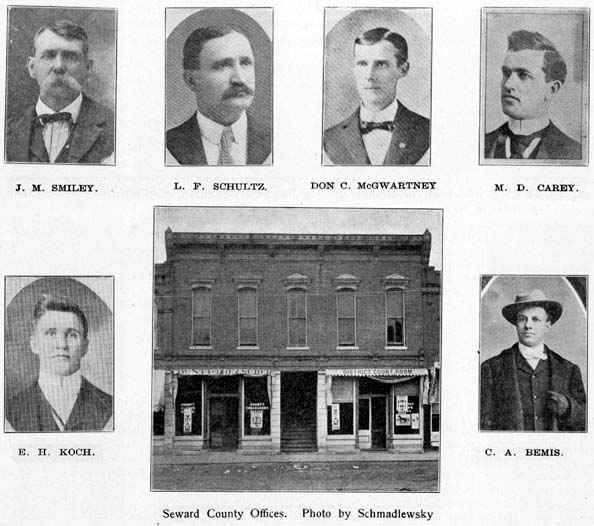|
322
|
SEMI-CENTENNIAL HISTORY OF
NEBRASKA
|
|
member of the firm of Wright & Wright,
lawyers, at Gering, Nebraska. Mr. Wright. was married
June 17, 1903, to Miss Minnie M. Fink of Scott's Bluff
County and they have one daughter.
W. E. MORSE is a
native of Illinois, having been born in Nora, May 29,
1859. He removed with his parents to Iowa in 1876, came
to Hooper, Nebraska, in 1880, and six years later to
Scott's Bluff County, where he homesteaded and has since
made his home. He was married to Miss Luella V. Newman of
Darlington, Wisconsin, and they have one daughter. Mr.
Morse has a ranch of 560 acres in Banner County,
Nebraska, which he has well stocked with horses. He is a
member of the Republican party, is Deputy Treasurer of
Scott's Bluff County and Director of the Gering
Irrigation District. He has also been a school director
and Deputy Sheriff of this county.
M. BRISTOL was
born on a farm near Alta, Illinois, November 24, 1861.
His father is a veteran of the Black Hawk War and still
lives on the place he settled upon in 1832. Mr. Bristol
gained his education in the public schools and the high
school of Peoria, Illinois. In 1886 he came to Scott's
Bluff County and homesteaded. He now owns a half section
of irrigated farming land in Scott's Bluff County. Mr.
Bristol is a Democrat in politics and has been Mayor of
Gering and of Mitchell, Nebraska; also Deputy Sheriff and
is now the Deputy Clerk of Scott's Bluff County.
OSCAR W. GARDNER
was born in Montgomery County, Illinois, January 24,
1860, and graduated from the Academy at Hillsboro,
Illinois, in 1881. In 1884 he came to Broken Bow,
Nebraska, and one year later to what is now Scott's Bluff
County. He helped to divide old Cheyenne County and to
organize Scott's Bluff County, and in the winter of 1886
and 1887 formed a joint stock company and laid out the
town of Gering, of which he was the first postmaster. Mr.
Gardner is identified with irrigation interests in this
county and owns considerable land which he has under
irrigation and cultivation. He is Secretary and Attorney
of the Gering and Central Irrigation Districts. He
studied law in an office in Gering and was admitted to
the bar in 1892. He is a member of the Republican party
and has served as County Judge of Scott's Bluff County,
and at present is Mayor of Gering.
C. B. WHIPPLE is
a native of New Hampshire, having been born November 29,
1843, in New Boston, where he lived until his
twenty-fifth year, when he removed to Illinois. In 1874
he went to Washington County, Kansas, and the next year
to Nodaway County, Missouri. He came to Boone County,
Nebraska, in 1882 and in 1887 settled in Scott's Bluff
County, where he took a homestead and has been engaged in
the mercantile business. He enlisted in Company K of the
Seventh New Hampshire in 1861 and was mustered out
October 29, 1864. Mr. Whipple is a Republican and has
twice served the county as its Treasurer.
SEWARD COUNTY.
Seward is an
agricultural county, and as a consequence of its deep
black soil and the abundant water supply furnished by the
Big Blue, West Blue and Lincoln, Middle and Beaver and
Plum Creeks, all the streams are lined with beautiful
trees. There are great many wells, both surface and
artesian. The principal industries are farming, dairying
and fattening of cattle and hogs. In 1899 Seward took
first place in its production of oats, which was over
2,000,000 bushels. Quite an acreage is planted to sugar
beets. There are 2,285 farms, 358 of which have recently
changed owners. There are seven flour and grist mills and
two brick yards. Seward was organized in 1867. Its
original name was Green, in honor of Senator Green.
William H. Seward's name was afterward chosen because Mr.
Green proved a traitor to the Union in the Civil War. The
county seat is also Seward, and it has a population of
1,970 people. The county population is 15,690, of which
5,718 are school children No school has a term of less
than six months The first settlement was made by Daniel
Morgan and sons, William and Thomas and Lewis, in 1858.
In 1863 homestead claims were taken up by Job Reynolds,
Thomas L. Rodgers, Samuel Long and C. J. Neihardt. The
second permanent settlement was made by Thomas West and
son and Orian Johnson.
|




